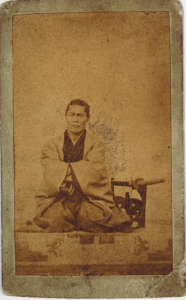

loyalty(忠), pronounced chū
Makoto is a combination of the characters for “to say” and “to do” (or “to accomplish”). “To do what one says” is to be sincere. Chū is a combination of the characters for “inside” and “heart” (or “mind”): A loyal samurai keeps his heart and mind within the fold of his feudal lord, or daimyo. This may be directed at one’s country, or even family or friends.
But even the most loyal person of the best intentions might lack the guts do what he says. It might be too dangerous. Or perhaps the sacrifice would be too great. Which is one of the reasons why courage, both physical and moral, is so important.
So if you think about it, these basic bushidō virtues are not exclusively “of the samurai” or even Japanese. Rather, it seems, “the way of the samurai” is to a certain extent universal.
